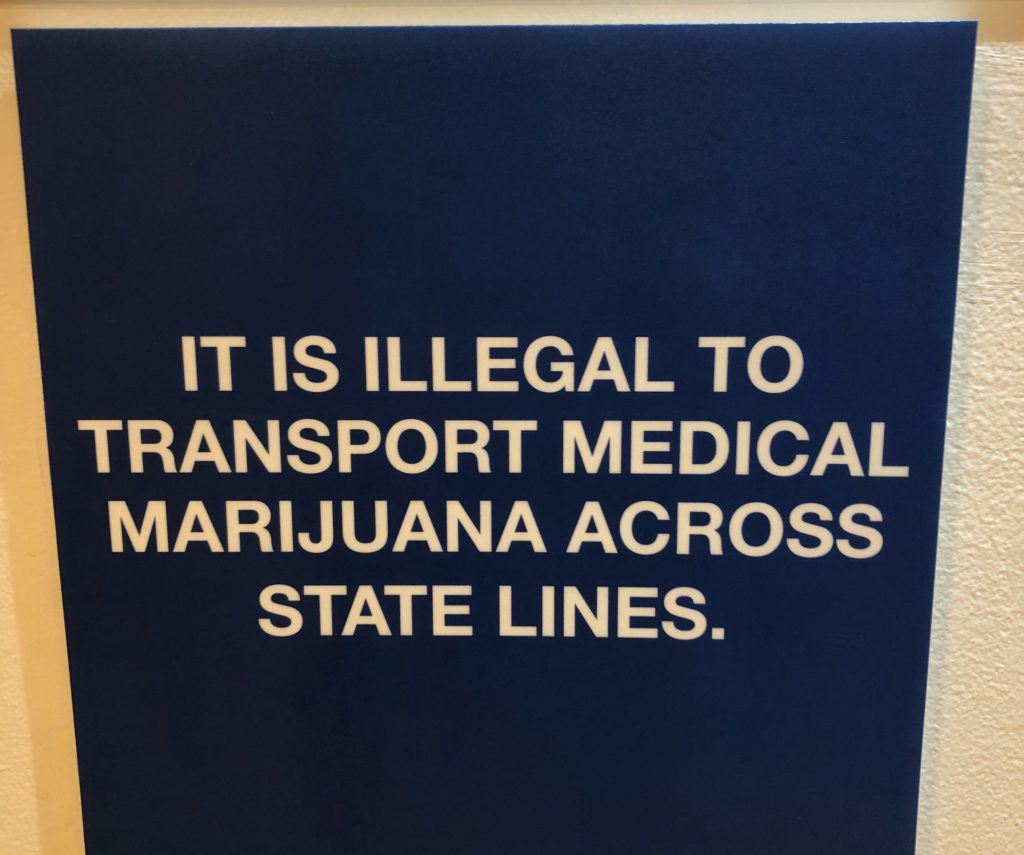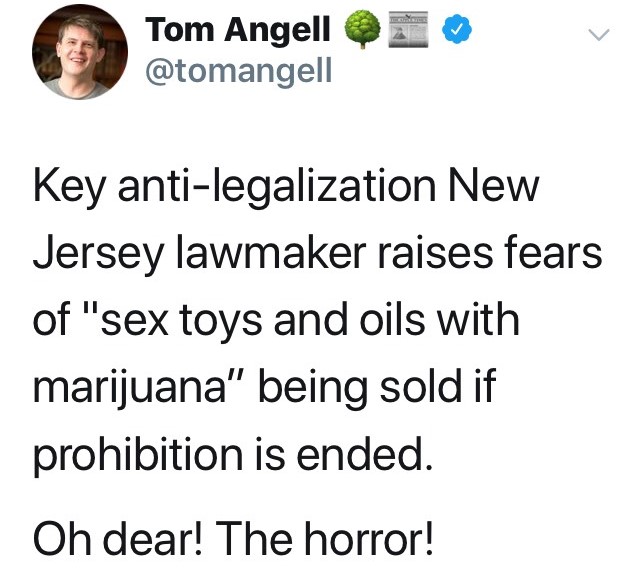10 Lessons for NJ from DC's Medical Marijuana Program

If it feels like NJ's medical marijuana program is languishing a bit, that's because it is. And while Gov Phil Murphy has made some marginal improvements, with a program this bad, baby steps won't suffice.
Washington DC recently began to honor out-of-state medical cannabis ID cards. I checked out DC's dispensary scene on a recent visit. Turns out, there're doing better by patents in DC than we are here in NJ.
Here are 10 lessons lawmakers and regulators could take from DC's superior example:
More dispensaries per capita, square mile.
No matter where you live in Washington DC, you won't drive far to find medical cannabis. I stayed in DC's Logan Circle neighborhood. The nearest dispensary, Capital City Care, was 1.3 miles away, a scant 13 block walk. That's a level of convenience we can only dream of here in NJ.
There are currently 5 dispensaries operating in DC, servicing 675,000 residents in a tiny 68 mi2 area. Not counting out-of-staters like myself, that's one dispensary for every 135,000 residents. Contrast NJ, home to only 6 dispensaries serving nearly 9,000,000 people. That means, on average, each Garden State dispensary serves a population of 1.5 million people. That's crazy. The Murphy administration is poised to bring another half-dozen dispensaries on line . Good news in the medium-term.
Meantime, expect increased demand while the supply side struggles to keep up.
Selection.
Medical cannabis consumers in DC have a range of options including flowers/buds, hash, edibles, oil, shatter, kief, rosins, tincture, and lotions.
Most NJ dispensaries only sell flowers. No edibles. The one in Bellmawr sells lozenges, lotions, and very expensive cannabis oil concentrates. The dispensary in Cranbury sells oil as well. Concentrates are ideal for especially sick patients because smaller amounts achieve the same therapeutic effect.
Curiously, dispensaries who do sell oils must market them as topicals even though they're much more suitable for a vape device.
I was the very first person to purchase non-flower cannabis in the state of NJ. Afterwards, I raced home to do a little quality control PSA and to let fellow patients what these dispensaries were forbidden by law to say: that these so-called topicals are indeed better off in a vape.
What does it say about our program when the dispensaries are compelled to market their products in a screwy way?
That's for you to decide.
PRICES
Prices at DC dispensaries are cheaper, but not as much as you might think. An ounce of the best quality medicine in NJ will set you back roughly $440. In DC, ounces sell for about $380. I'd take DC's slightly lower rates any day, but honesty, it's too expensive in DC too.
HOME GROW
DC residents who can't (or won't) shell out $380 for an ounce of medical cannabis have a powerful tool their disposal: liberty. They're free to grow their own, up to 6 plants. Of course, since DC voters passed a recreational cannabis referendum, anyone in the District can grow their own. This is especially beneficial for sick or disabled people who don't work.
There's no appetite in Trenton to permit patients to grow their own cannabis, even though doing so would address issues of cost and convenience.
Home grow provisions are the holy grail for advocates in New Jersey. When we have the freedom to grow cannabis in the Garden State, we will have won.
CHARGE IT!
Medical cannabis is a cash-only business in NJ. That's mostly on banks and credit cards who remain weary of an industry that's still technically illegal on a federal level. Insurance won't cover it either. Not yet anyway.
Unbeknownst to me, dispensaries in DC do accept credit cards for medical cannabis purchases.
"Dang," I lamented, quickly doing the math in my head. "I'm $5 short and I need everything I picked out. There's probably $5 in quarters in my glovebox..."
She cut me off mid-sentence.
"We accept debit and credit cards here," she said, watching the incredulous look unfold across my face.
And just like that we're back in the game! I spent another $300.
I don't know what kinda shell game/workaround/hack these dispensaries employ to enable cashless transactions - the charge appeared on my statement as VF DC REALITY LLC - but I'm happy for the convenience.
And the AmEx points.
Likewise, there are several companies enabling cashless transactions at dispensaries all over America.
Take Wellness Connection, a dispensary in Maine, who use something called Canpay to grease the wheels of commerce.
“Being able to offer an alternative payment method to cash legitimizes our company,” Patricia Rosi, Wellness Connection CEO told Leafly. “And most importantly, it offers increased convenience and safety for our patients and our staff. Wellness Connection is proud of meeting the high level of compliance required by our banking partner and Canpay for this new secure way of payment.”
But not in NJ.
Extra Doctor Visits.
Patients in DC must re-certify annually with their doctor to stay in compliance. NJ residents must re-certify every two months. In my case, those visits cost $100 a pop. In NJ, your primary care physician won't suffice because that would be way too easy.
This requires a legislative fix. And with Senate President Steve Sweeney's recent vow to tether medical- and recreational marijuana into a package deal, prospects for a quick resolution appear dim. Sweeney literally wants to tie the fate of sick and dying NJ residents to the very complicated recreational debate. Linking the two, recreational and medical, is a cynical ploy by some legislators designed to put their needs ahead of sick and dying NJ residents.
That's disgraceful. And for now, it's on Sweeney's enduringly brittle ego.
In the meantime, I'm forced to pay $100 every two months to convince a doctor that I'm still HIV+ just to stay compliant.
Opiate Use Disorder
DC residents with an opioid or heroin addiction can legally access cannabis therapy in DC. Heroin detox is like the nastiest case of food poisoning combined with a nervous breakdown. Cannabis therapy helps with detox' worst symptoms: anxiety, lack of appetite, night sweats, insomnia, and the shakes commonly associated with heroin withdrawal.
Jeff Brown is assistant commissioner for medicinal marijuana at NJ Department of Health. He explains how some opiate-dependent NJ residents have access.
"Patients who have opioid use disorder due to the treatment of chronic pain with opioids can get medicinal marijuana now," Brown told InsiderNJ.
They qualify under the rubric of "chronic pain" and not their actual addiction.
"The Commissioner is exploring adding opioid use disorder more broadly, provided it’s paired with more traditional MAT" Brown added, referring to medical assisted therapy such as methadone.
If you follow NJ Health Commissioner Dr Shereef Elnahal on Twitter you'll see him traveling the state, working to reduce the stigma among fellow physicians. He penned a recent oped "asking ... fellow physicians to enroll in the program and consider medical marijuana as another effective, therapeutic tool for many of their patients."
Now imagine how much more effective Commissioner Elnahal's effort might be if statehouse lawmakers weren't so preoccupied with personal grievances.
But I digress....
EFFORTS TO IMPROVE NJ's medical cannabis program aren't playing out in a vacuum. While crafting this column, prudish pot prohibitionist Sen Ron Rice went viral for remarks about cannabis-infused "sex toy oil."
More positively, Jersey City moved to decriminalize cannabis within city limits. NJ Attorney General Gurbir Grewal then announced a moratorium on cannabis-related prosecutions statewide until at least September.
Clearly, the recreational marijuana debate is in full swing. It's an important discussion with massive economic and social justice ramifications.
But you can always count on this column to keep medical cannabis front and center.
Jay Lassiter tested HIV+ back in 1995, and he's been smoking medical cannabis ever since. Most of that time as a criminal. When he arrived in NJ in 2003, he immediately set out transforming the state's media landscape, first at BlueJersey, then later as the first credentialed state house blogger in America. After a stint doing communications for Comgressmen Rob Andrews and John Adler, Jay produced and hosted the award-wining podcast Heroin Uncut, the Truth about the Crisis. He's on Twitter @Jay_Lass.






